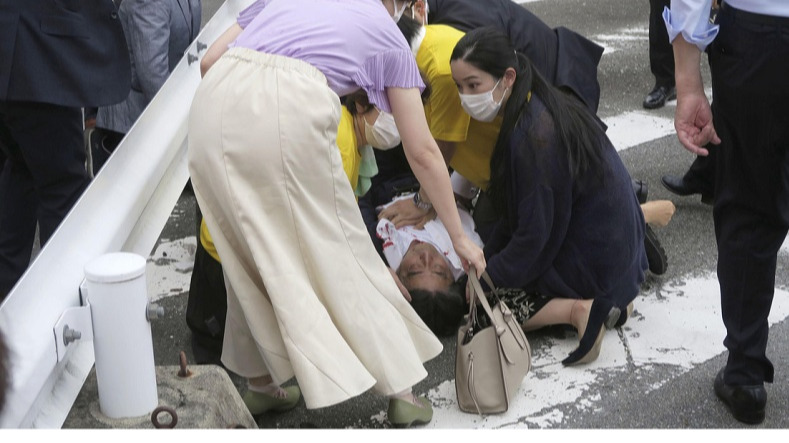
Japan's former Prime Minister Shinzo Abe on the ground after being shot in Nara, Japan, July 8, 2022. Kyodo News / AP
By Guillermo Alvarado
Japanese society is under the impact of a great shock, and will likely remain so for a long time, following the assassination of former Prime Minister Shinzo Abe, arguably one of the most influential politicians in that nation since the end of World War II.
He was elected three times to head the government, although his first term, from 2006 to 2007 was quite stormy and ended abruptly for health reasons, which did not prevent him from coming to power again in 2012 where he remained until 2020, when he resigned.
Japan is a relatively peaceful country, where in 2018 there were just nine deaths from gun injuries against more than 39 thousand in the United States. The sale of handguns is highly restricted and to obtain a license a long and very rigorous procedure must be passed.
This is not to say that he has not been the victim of acts of violence and many remember the sarin gas attack in the Tokyo subway on March 20, 1995, but these are truly exceptional cases.
Shinzo Abe's legacy will be remembered above all for his attempt to turn the country into a global power, not only in terms of foreign relations, but also in military and economic terms.
To achieve this, he proposed to amend Article 9 of the Constitution, which expressly prohibits the existence of an army, the declaration of a state of war and participation in international operations.
He succeeded only in having a reinterpretation of this norm approved between 2014 and 2015, to exercise the so-called right to "collective self-defense."
In any case, Japan has a fairly well-equipped force, with air, land and sea branches and, according to the Stockholm International Peace Studies Institute, its military budget is among the six largest in the world.
With regard to the economy, the so-called Empire of the Rising Sun suffered a severe setback due to the real estate crisis of 1991. Until 1989 of the 50 largest companies on the planet, thirty-two were Japanese, while in 2018 only one remained.
Shinzo Abe tried to face the situation with a mixture of economic doctrines, which was called "Abenomics", which in the end led to pure neoliberalism, without achieving recovery, but increased discontent among the people.
His assassination, a condemnable act from every point of view, puts an end to a political era and signals a warning about the increase of violence, a plague that today affects most of the world.

